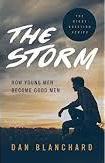|
I have just completed Dan Blanchard’s excellent brief novel, The Storm. The Storm is definitely not on my normal reading list. It is geared toward young adult readers and, at 69, I certainly don’t match that demographic, but I found myself captivated by both the content and the delivery. Regarding the content, I was familiar with most of it from my own professional career. As a public employee and private consultant I implemented Total Quality Management in government and criminal justice organizations. I also served on the management team for the Connecticut Award for Excellence. In those capacities, I studied under TQM experts from organizations like GE Capital, United Technologies and the Juran Institute, (Headed by Joseph Juran, Edward Deming’s partner in implementing TQM in post-WWII Japan) where I practiced concepts like Kaizen, Pareto Analysis, Strategic Planning, Goal Setting, Mission Statements and Continuous Quality Improvement. A remarkable achievement of Blanchard’s book is that he manages to cover these topics and many more in the span of about 180 pages. In addition to the management concepts, Blanchard delves deeply into the social and emotional requirements of being a leader. He generously cites many of those who provided inspiration for the lessons learned including: Socrates, Gandhi, Edward Deming, Douglas MacArthur, Anthony Robbins, Vince Lombardi and even Adolf Hitler. An equally impressive accomplishment is Blanchard’s method of delivering this content. These topics might be abstract and dry, even for seasoned professionals, but could be deathly boring for teenagers. Blanchard avoids this trap by couching his lessons in a highly entertaining story about a conversation between a teenage boy and the “secrets” his grandfather wants to share with him on a stormy afternoon. Each concept presented is subsequently grounded in the young boy’s personal experiences. Blanchard doesn’t flinch away from uncomfortable topics in the process. We discover that the teenager’s life is far from perfect as we learn about his abusive father and emotionally damaged brother. As the conversation continues the young man’s grandfather imparts additional lessons about gratitude, teamwork, service and delayed gratification. If there is anything I take exception with in Blanchard’s exposition, it’s that he sometime seems to overreach in his description of a leader. The reality is that in many of life’s endeavors, there can be only one top performer and the book, at times, doesn’t seem to provide enough credit for doing one’s “personal best.” Still, he does allow some wiggle room. Granddaddy suggests “shooting for the stars” so that if you do fall short, you still land on the moon. This is a book filled with useful information and much wisdom. Blanchard is correct when his “granddaddy” character laments that schools fail to incorporate many of these principles in their curriculum and even many adults don’t learn them until late in life, if at all. Until that situation changes, the best we can hope for is that our young adults have alternative ways to access and appreciate these essential life lessons and Dan Blanchard’s, The Storm, is certainly an excellent place to start.
0 Comments
Leave a Reply. |
AuthorChuck Miceli works like hell to write heavenly novels Archives
January 2021
|

 RSS Feed
RSS Feed